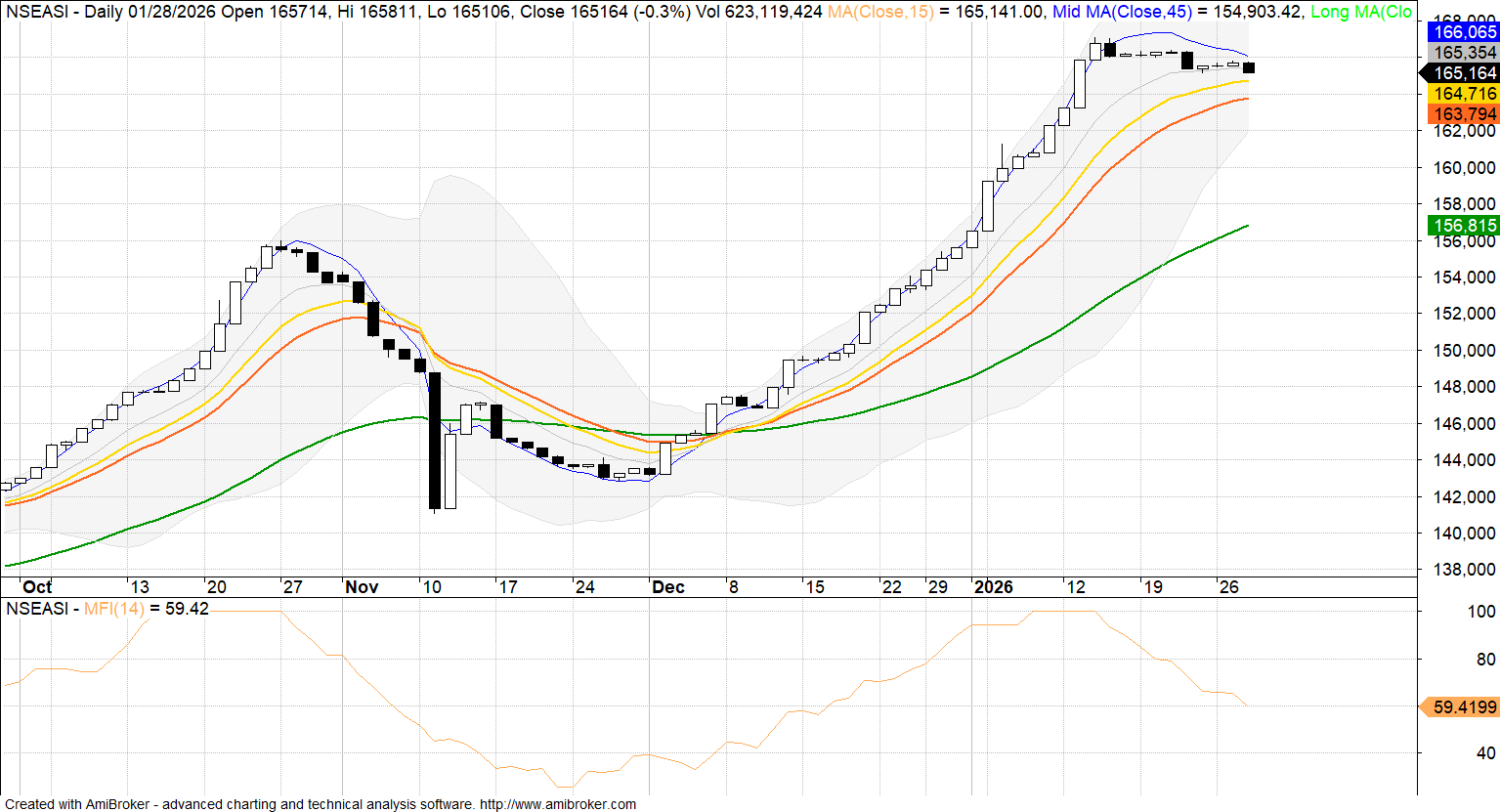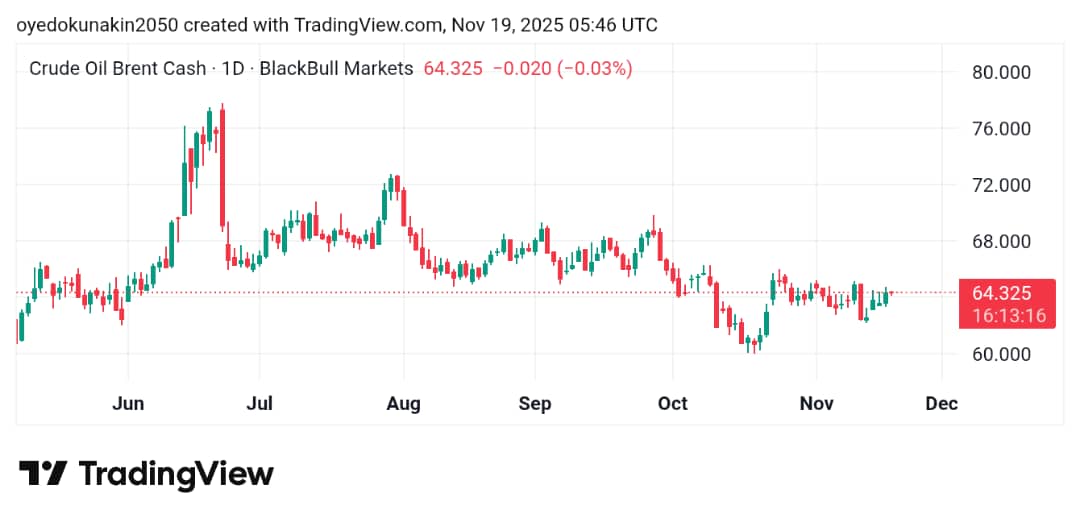
Akintunde Oyedokun
Research Analyst
Oil prices steadied on Wednesday after dropping to a one-month low, with investors balancing oversupply fears against progress in Russia-Ukraine peace negotiations. Brent hovered at $62.35 and WTI at $57.88. Signs of a potential peace deal raised the possibility of eased sanctions on Russian oil, adding pressure to an already soft market. OPEC+ is expected to maintain current production levels, while the Caspian Pipeline Consortium resumed exports. U.S. data showed crude stocks declined last week, even as fuel inventories rose.
Rising Inflation Shifts Australia Away From Rate-Cut Expectations
Australia’s inflation climbed for the fourth consecutive month in October, reaching 3.8% and surpassing forecasts. The stronger-than-expected data lifted the Australian dollar and bond yields, prompting investors to abandon hopes of rate cuts next year and consider the possibility of a rate hike instead. Core inflation also edged higher, driven by rising services and housing costs. With price pressures moving further from the RBA’s 2–3% target, the outlook now suggests monetary policy may remain tighter for longer.
New Zealand Cuts Rates but Signals End Of Easing Cycle
New Zealand’s central bank cut its cash rate by 25 basis points to 2.25%, the lowest since 2022, but indicated that the easing cycle is likely over as the economy shows signs of recovery. Markets reacted by pushing the New Zealand dollar higher and scaling back expectations for further cuts. Forecasts suggest rates will remain steady through 2026, reflecting a cautious, hawkish stance. The move brings total easing since August 2024 to 325 basis points, aimed at supporting an economy that has contracted in three of the last five quarters.
Senegal Revises GDP Up, Debt Ratio Looks Lower
Senegal’s GDP is now estimated 13.5% higher after updating the base year from 2014 to 2021, slightly improving the debt-to-GDP ratio to 80% from 90.8%. The recalculation reflects new sectors like digital finance, oil and gas, and cashew production. Analysts note that while the optics improve, the country’s actual debt and fiscal obligations remain unchanged. The revision follows a hidden debt scandal that had paused the IMF’s $1.8 billion lending programme, which the Fund says will now benefit from better economic data.
Nigeria’s Money Supply Rises To N119 Trillion
Nigeria’s broad money supply (M3) grew to N119.04 trillion in October 2025, up 1.06% from September and 10.22% year-on-year, driven mainly by a 10.65% surge in net domestic assets. Net foreign assets fell 16.45% month-on-month but remain higher than last year. M2 and narrow money (M1) also rose modestly, showing growth mostly from deposits and domestic credit. The increase follows the CBN’s September rate cut and reflects rising domestic liquidity while maintaining caution to keep inflation in check.
Invest 2026 Traders & Investors Summit
Theme: Pre-Election Year Investment Opportunities & Risks
Sub-Topics
- Comprehensive Earnings Guide for Profitable Investing and Trading in 2026, by Mr Peter Sunday Adebola, Managing Director/CEO Edgefield Capital Management Ltd
- Pre-Election Year Rally: How Economic Events & Tax Reforms Fuel Bull Or Bear Cases In 2026, by Mr Teriba Adeboye, MD/CEO, Qualinvest Capital ltd
- NGX Pre-Election Year Performance & Historical Patterns:10 Golden Stocks For Profitably Investing, by Mr Ambrose Omordion, CRO. Investdata Consulting Ltd
- Nigeria Infrastructural Gap & Fiscal Policy Reforms: Where are Investment Opportunities in 2026, by Mr Tope Ojo, Managing Partner, Tope & Tunde Estate Surveyors & Valuers
- Investment Opportunities In The Alternative Markets In 2026 & Beyond, by Dr Sylvester Anaba (PhD, FCS) Head Research, United Capital Plc
- The Pre-election Economy & 2016 Budget: Implementation and Impact On NGX, by Mr Abiola Rasaq, Former Head, Investor Relations & Portfolio Investments United Bank For Africa Plc
- NGX New Highs & Correction: The Power Of Price Action, Time & Momentum In Profitable Trading In 2026 & Beyound, by Mr Abdul-Rasheed Oshoma Momoh, ED Operations, TRW Stockbrokers Ltd
- Strategies For Equity Investing & Trading In A Pre-Election Year, by Mr Kebira Jimoh Aruna, MD/CEO GlobalView Capital Ltd
Riding the tide of pre- election Years in Nigeria, 2026 is not just any year—it’s part of a powerful historical trend or pattern that should be known to smart traders or discerning investors in any investment window, market or exchange in Nigeria today. It comes with tradable opportunities and risks that are associated with elections and post-elections. The ability to navigate between politics and economy creates the wealth to makes the difference in your investment. The reading of a nation’s electoral cycle and how investors perceive whether there could be a change in leadership or continuity, is a major factor that results in much of the uncertainty in pre-election years have been known for. This, it is believed can, and does spike market volatility and businesses, especially when it is seen that a new party may take power. This summit will help market players to navigate 2026 profitably by maximizing gains and minimize losses
Take away from this summit includes:
How to construct a resilient and Powerful Portfolio that adapts to market and economic changes.
● What to expect from the market and economy as the new tax reforms kicks off in 2026.
● Why historical patterns and trends in Nigerian election cycle is important when taking your investment decision in 2026 and beyond.
● The power of liquidity and corporate earnings in price movement.
● How to anticipate big sector moves and recovery in 2026 with ongoing reforms
● Understanding the cycle of 4 years opportunities time frames that comes with election preparation in Nigeria
● 10 golden stocks for 2026
Date: December 6, 2025
Fee: N75,000
Venue: Zoom
If you want to be among the winning investors and traders in 2026, send Yes to: 08028164085, and 08179547605 now.












